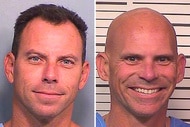Create a free profile to get unlimited access to exclusive videos, breaking news, sweepstakes, and more!
Jury Selection For Kim Potter's Trial In Murder Of Daunte Wright Continues
Potential jurors have been told to expect the defendant, former police officer Kim Potter, to testify in her own defense.

MINNEAPOLIS (AP) — Prosecutors and attorneys for the suburban Minneapolis police officer charged in Daunte Wright's shooting death resumed jury selection Wednesday and quickly seated a fifth juror.
Kim Potter, 49, is charged with first- and second-degree manslaughter in the April 11 shooting of Wright, a 20-year-old Black motorist, following a traffic stop in the Minneapolis suburb of Brooklyn Center.
The woman seated Wednesday, who described herself as a recent graduate, said she didn't know enough about Potter and Wright to have an opinion of the case. She also said she thought the protests against police in the Minneapolis area in recent years had a negative effect on the community because of the property damage they caused, and that she somewhat disagrees with the idea of defunding the police, saying "You're always going to need police officers."
Attorneys and Judge Regina Chu have probed potential jurors this week for what they knew about Wright's death and about their views of protests against police brutality that were frequent occurrences in Minneapolis even before George Floyd's death.
On Tuesday — the first day of jury selection — an attorney for Potter said jurors would hear directly from the former officer, who resigned two days after she shot and killed Wright. Potter, who is white, has said she made a mistake by grabbing her handgun instead of the Taser she meant to draw.
"Officer Potter will testify and tell you what she remembers happened, so you will know not just from the video but from the officers at the scene and Officer Potter herself what was occurring," Paul Engh, one of her attorneys, told a potential juror.
Six days have been set aside for jury selection, with opening statements scheduled for next Wednesday.
Wright was shot in Brooklyn Center as former Minneapolis Officer Derek Chauvin was standing trial only miles (kilometers) away for killing Floyd. Jury selection at Potter's trial has followed a similar path as it did at Chauvin's trial, with potential jurors questioned about their attitudes toward Black Lives Matter, policing and protests.
Potter shot Wright as he tried to drive away from a traffic stop. Wright's death sparked several nights of protests in Brooklyn Center.
The jurors seated Tuesday are a medical editor, a retired special education teacher, a Target operations manager and a woman whose occupation wasn't given. The court described the four as two white men, one in his 20s and one in his 50s; a white woman in her 60s; and an Asian woman in her 40s.
The medical editor said he has a very unfavorable view of the "blue lives matter" slogan, saying he believes it's less about supporting police than about countering the Black Lives Matter movement.
But he also said he opposes the movement to abolish or defund the police.
"I absolutely believe there's a need for change," he said. "But I think defund the police sends a message, a negative message. ... I don't agree with that message and I don't agree with the approach that was taken to defund the police."
The Target employee, who also plays bass in a rock band, described himself as somewhat distrustful of police but said he recognized "that it's a very hard job."
The woman whose occupation wasn't given described herself as a "rule follower" who said she felt police officers should be respected. She said on a questionnaire that she somewhat agreed that police officers should not be second-guessed for decisions they make on the job.
"I think sometimes you just react, and sometimes it might be a wrong reaction, but, you know, mistakes happen," she said. "People make mistakes."
Still, she said she would make a decision based on the evidence.
Seven jurors were dismissed, including some who expressed strong views of the case. One woman said on the jury questionnaire that she viewed Potter very unfavorably and that she should have known the difference between her gun and her Taser. A man expressed wonder that a seasoned officer could make such a mistake, and told defense attorneys, "I don't know if you'd want to select me."
One man questioned in court described Black Lives Matter as "Marxist Communist" and suggested Wright was to blame for his death: "I think if he would've listened to the (police) directions, he would still be with us."
Jurors' names were being withheld and they were not shown on the livestream of the trial. But efforts to protect their identities slipped at times, with defense attorney Earl Gray appearing to say two prospective jurors' names aloud. That led Chu to warn attorneys to be more careful.
Potter said she made an innocent mistake when she shot Wright. She and two other officers at the scene moved to arrest Wright after learning there was a warrant out for him on a gross misdemeanor charge.
As Wright tried to drive off, Potter can be heard on her body camera video saying "Taser, Taser Taser" before she fired, followed by, "I grabbed the wrong (expletive) gun."
Prosecutors say she was an experienced officer who was trained to know better. The most serious charge she faces requires prosecutors to prove recklessness; the lesser only requires them to prove culpable negligence. Minnesota's sentencing guidelines call for a sentence of just over seven years on the first-degree manslaughter count, and four years for second-degree. Prosecutors have said they'll seek a longer sentence.
The jury pool comes from Hennepin County, which includes Minneapolis and is the state's most populous county. Hennepin is 74% white, 14% Black, 7.5% Asian and 7% Latino, according to census data. Brooklyn Center is one of the most diverse cities in the state, at 46% white, 29% Black, 16% Asian and 15% Latino.






















